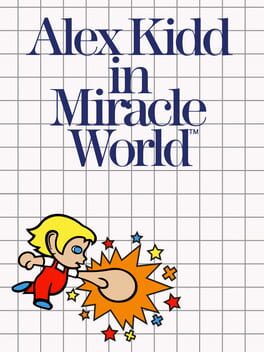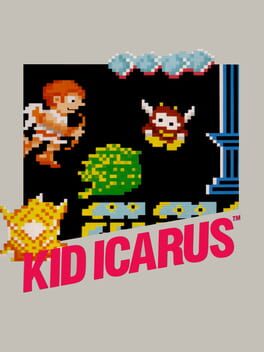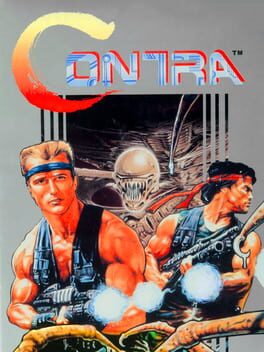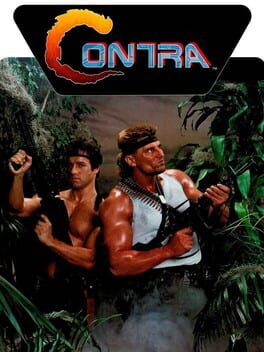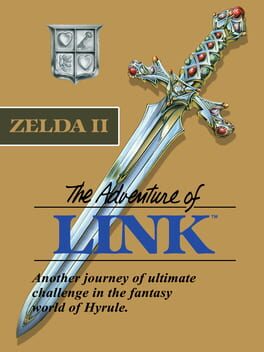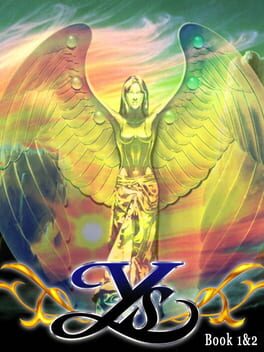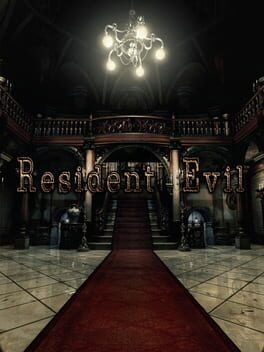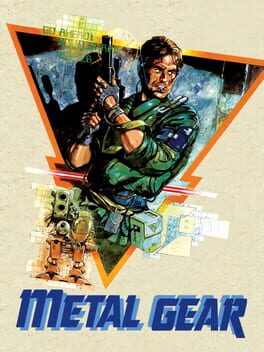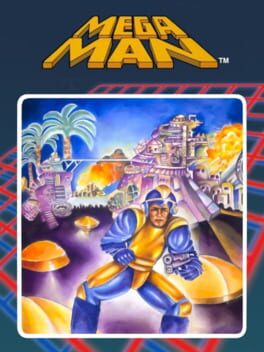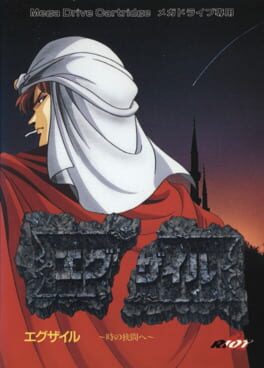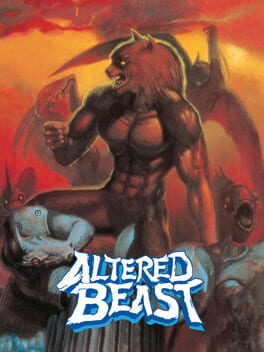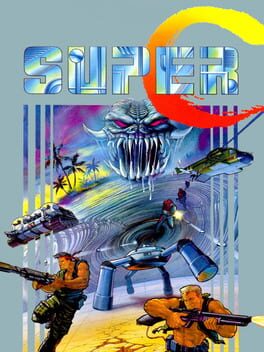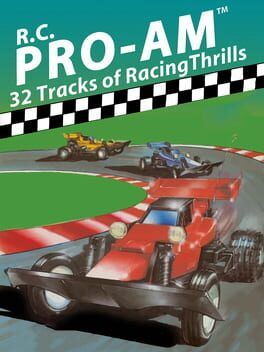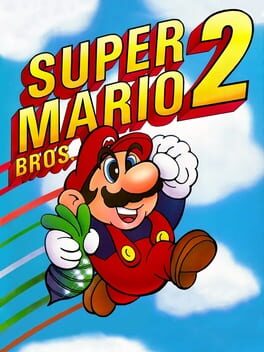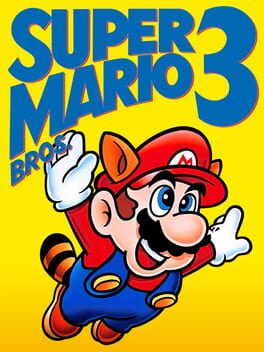TheMaxine
What an odd game this one is. And not like, "wow, it's so wacky and kooky!", I mean more like "I don't know the proper way to formulate my opinion on this thing."
It almost gets there, I mean, it has variety to spare. You make your way through vertical levels, horizontal ones, plus you've got some dungeons, and neat little powerups, and decent controls, and catchy music... So what is it about this game that doesn't stack up to something like Mario 1? I can't place my finger on it.
I think part of it is that very expectation of matching up to Mario 1's quality, which Alex Kidd isn't necessarily attempting to do. It's a slower take on the platformer genre, which emphasizes collecting things a lot more. You're gonna want to stop in your tracks frequently to break open those blocks and amass the cash for the powerups required. I don't usually mind systems like this, but I feel it repeteadly breaks the flow of the game here.
There's also the more subjective matter of the level design being nowhere near as memorable as the plumber contemporary, but there's also the most obvious complaint I could throw at this game, the boss fights. It's a Rock-Paper-Scissors game, everytime. Not a test of your skill, not a test of anything you have learned throughout, it's pure luck. And I feel that makes the game come off as somewhat unconfident in its own gameplay system, like there's a setup here, but no payoff.
There's something... mindless about the whole thing. A lot of effort was put in, but so little of it truly stuck the landing. Putting it another way perhaps, Alex Kidd is a game full of ideas, but very little of them actually connect in a cohesive way. There's a reason why this franchise didn't last.
It almost gets there, I mean, it has variety to spare. You make your way through vertical levels, horizontal ones, plus you've got some dungeons, and neat little powerups, and decent controls, and catchy music... So what is it about this game that doesn't stack up to something like Mario 1? I can't place my finger on it.
I think part of it is that very expectation of matching up to Mario 1's quality, which Alex Kidd isn't necessarily attempting to do. It's a slower take on the platformer genre, which emphasizes collecting things a lot more. You're gonna want to stop in your tracks frequently to break open those blocks and amass the cash for the powerups required. I don't usually mind systems like this, but I feel it repeteadly breaks the flow of the game here.
There's also the more subjective matter of the level design being nowhere near as memorable as the plumber contemporary, but there's also the most obvious complaint I could throw at this game, the boss fights. It's a Rock-Paper-Scissors game, everytime. Not a test of your skill, not a test of anything you have learned throughout, it's pure luck. And I feel that makes the game come off as somewhat unconfident in its own gameplay system, like there's a setup here, but no payoff.
There's something... mindless about the whole thing. A lot of effort was put in, but so little of it truly stuck the landing. Putting it another way perhaps, Alex Kidd is a game full of ideas, but very little of them actually connect in a cohesive way. There's a reason why this franchise didn't last.
1986
Listen, I'll try to make this review shorter than this game's levels. The summary of the review is... cut the levels by half, and this could've been an infinitely better game.
As much as the upgrade systems were a little difficult to grasp (that's on me for not reading the manual...), I did enjoy the feeling of scaling my way up the vertical stages, and strategically taking down the enemies in my way. The dungeon-like levels and horizontal ones weren't too bad either.
My willingness to replay this game again however, is ruined by the exhausting length of each stage, its layout copy-pasted several times to pad things out. If they wanted Kid Icarus to feel like a grand adventure through how big it is, that's fine, but you're gonna have to do a lot more than this. As it stands, there's too much here for too little gain.
As much as the upgrade systems were a little difficult to grasp (that's on me for not reading the manual...), I did enjoy the feeling of scaling my way up the vertical stages, and strategically taking down the enemies in my way. The dungeon-like levels and horizontal ones weren't too bad either.
My willingness to replay this game again however, is ruined by the exhausting length of each stage, its layout copy-pasted several times to pad things out. If they wanted Kid Icarus to feel like a grand adventure through how big it is, that's fine, but you're gonna have to do a lot more than this. As it stands, there's too much here for too little gain.
1988
I really like this one. It's a solid start to the franchise, and arguably, still one of the most approachable ones due to its simplicity. The whole package lasts less than 30 minutes without deaths, but offers a good variety of levels throughout. The shooting feels great, and the spread shot reigns as the king of run 'n gun weapons. It's a little like a handheld game, just something you pick up and immediately get into.
But of course, the difficulty here has to be addressed. You could beat this within 30 minutes, but if you're intending to play the game as intended, that could be a whole lot longer. While its short length does lean itself into doing several runs to see how far you can get this time, your enjoyment does weigh on whether you're willing to master that type of trial 'n error gameplay.
Me personally, I use the Konami code to give myself 30 lifes. What you could do though, is start off with that for a practice run, then take the training wheels off after all and go for that 2-lifes run. Whether you play it casually or for the sake of mastering it though, it's fun either way, one of the NES must-plays.
Also I will say, you might wanna consider grabbing the Japanese release sometime, as I've only just recently learned that the USA version cuts out a shocking amount of visual flair, including cinematics and visual effects in stages. It was kind of like discovering a missing piece of Contra after 15 years of playing it.
But of course, the difficulty here has to be addressed. You could beat this within 30 minutes, but if you're intending to play the game as intended, that could be a whole lot longer. While its short length does lean itself into doing several runs to see how far you can get this time, your enjoyment does weigh on whether you're willing to master that type of trial 'n error gameplay.
Me personally, I use the Konami code to give myself 30 lifes. What you could do though, is start off with that for a practice run, then take the training wheels off after all and go for that 2-lifes run. Whether you play it casually or for the sake of mastering it though, it's fun either way, one of the NES must-plays.
Also I will say, you might wanna consider grabbing the Japanese release sometime, as I've only just recently learned that the USA version cuts out a shocking amount of visual flair, including cinematics and visual effects in stages. It was kind of like discovering a missing piece of Contra after 15 years of playing it.
1987
To me, it's just an inferior version of the NES original. Less content, and a visual presentation, which although is graphically improved, has more awkward animations and a somewhat bigger character, which also means a bigger hitbox that makes dodging things harder. If I was in an arcade back in the 80's and this was there, I'd pop in a quarter, but in the modern age, I'd rather just go back to the console version.
I wouldn't be opposed against Zelda trying out something like this again. From a presentation and concept standpoint, I really like Zelda II. The upgrades when you leveled up scratched the right parts of my brain, and I'm one of those weirdos that actually liked the weighty combat system. Each palace had a sizable amount of fun rooms to traverse, and I looked forward to tackling each one.
I can't deny though, without cheats, I don't think I would have appreciated this one as much. In particular, I used the Zelda II Redux hack which added a lot of QoL, most importantly better checkpoints and balancing. Without that, I have no doubt in my mind that this game is annoying as fuck.
One thing I sorely miss from Zelda 1 are maps. There are none here, and the palaces don't have enough distinct landmarks at times to prove memorable, so, online maps were in order.
My greatest mistake was heading into the final dungeon without realizing you needed the final spell to defeat the boss. Imagine doing that entire gauntlet, and then realizing you're gonna have to do it again.
The thing about Zelda II nowadays is that by itself, you're likely to play a gruellingly punishing game with dungeons that are more difficult to traverse than the likes of the first game. However, the Zelda community is lovely in this regard, as it has taken the painstaking task of providing you with many ways to fix this game into something fun. There's the aforementioned Redux hack, but there's also a fanmade PC version of the game, called "Zelda 2 Enhanced Edition" that brings similar QoL changes, among new ones such as a map system, and additional neat areas to explore. There's many good ways to play this game. But preferably, discount the original as one of them.
I can't deny though, without cheats, I don't think I would have appreciated this one as much. In particular, I used the Zelda II Redux hack which added a lot of QoL, most importantly better checkpoints and balancing. Without that, I have no doubt in my mind that this game is annoying as fuck.
One thing I sorely miss from Zelda 1 are maps. There are none here, and the palaces don't have enough distinct landmarks at times to prove memorable, so, online maps were in order.
My greatest mistake was heading into the final dungeon without realizing you needed the final spell to defeat the boss. Imagine doing that entire gauntlet, and then realizing you're gonna have to do it again.
The thing about Zelda II nowadays is that by itself, you're likely to play a gruellingly punishing game with dungeons that are more difficult to traverse than the likes of the first game. However, the Zelda community is lovely in this regard, as it has taken the painstaking task of providing you with many ways to fix this game into something fun. There's the aforementioned Redux hack, but there's also a fanmade PC version of the game, called "Zelda 2 Enhanced Edition" that brings similar QoL changes, among new ones such as a map system, and additional neat areas to explore. There's many good ways to play this game. But preferably, discount the original as one of them.
1989
A series of two games, treated as one continuous adventure that has its pros, but with far more egregious cons.
For those who appreciate the visual and auditory aesthetic of the 90's, the PC-Engine version of Ys I & II is a treat. I always looked forward to seeing the next hand-drawn piece of art, reminscent very much of the anime of that time. And my god, that music. This was one of the very first games to utilize CD audio, and they went all out on giving you one of the best soundtracks you'll ever hear. Soothing melodies, heart-pumping rock music, mysterious and ambient dungeon themes... There is so much to savor here.
The combat was unconventional, but intuitive to grasp. In contrast to turn-based RPG games, getting experience here involves bumping into your enemies at specific angles to deal rapid damage. In turn, enemies can do the same to you, albeit there are a couple ways to easily recover your HP, alongside a built-in quicksave feature. It's a fast-paced combat system that may prove more tense than you expect, but I liked it all the same.
With all that said, it was not easy giving this game two and a half stars. I mean, in spite of all that it has going for it, the most important question is... do you like mazes?
Ys's greatest weakness to me, was its level design, and that appeared evident as early as the game's second dungeon, featuring a darkness gimmick. You've got a small spotlight on you, and a series of confusing samey-looking caves with multiple splitting paths. Some of them loop around, some of them lead to dead ends. With my limited field of view, I kept walking around in circles.
This is followed up by the third dungeon, and the final one in Ys I. Suddenly, the game decided that after the last two dungeons lasting approximately 20-30 minutes, it's time for one that might as well be an entire half of the game. Although a number of unique things happen here, there were also many minor annoyances that all added up into something I really wished would've wrapped up sooner. Trial 'n error teleporting tiles, instances of backtracking, repetitive outer rooms that feel like they're there to pad out time, and the same song being drilled into your head over and over, which unfortunately was one of the weaker ones in the soundtrack to boot due to its choice of nasally synths.
All of this really tested my patience, but eventually, I reached the latter half of the package, the sequel. Which, actually was a little better in how it handled dungeon design. That is, until I got to the shrine/sewers part of the game, in which all the worst facets of maze design proceed to unfold all at once.
I simply had no idea where I was going. Things were constantly out of reach, and I had no clue how to get to any of them without hitting the same dead end I've already hit 20 times before. Multiple entrances, multiple exits, and the sewers have two layers of maze, with an upper and bottom floor which you have to figure out the right way to switch between as the game sees fit. A guide did not help. Everything looks the same, so I was incapable of placing my exact position. There was also the possibility I was doing things out of order, but I really couldn't tell. Eventually, I gave up, as it turned out I was about 30 minutes away from the credits. The rest was watched via longplay.
I wanna like Ys, and I want to give it another chance, perhaps with a later more polished game. What worries me is that according to Wikipedia, every subsequent Ys game somehow got a lower score than the previous one, that the series seemingly never reached the highs I feel it should have. It's part of why I've been hesitant to try more of them. However, if there are better much better Ys games out there after all, I'd love to find out about them. I know that there are other remakes of I & II, and they're likely better in some regards. This version of I & II though... god, I love it aesthetically but I don't ever wanna play through these dungeons again. Check out the soundtrack, but perhaps skip the game.
For those who appreciate the visual and auditory aesthetic of the 90's, the PC-Engine version of Ys I & II is a treat. I always looked forward to seeing the next hand-drawn piece of art, reminscent very much of the anime of that time. And my god, that music. This was one of the very first games to utilize CD audio, and they went all out on giving you one of the best soundtracks you'll ever hear. Soothing melodies, heart-pumping rock music, mysterious and ambient dungeon themes... There is so much to savor here.
The combat was unconventional, but intuitive to grasp. In contrast to turn-based RPG games, getting experience here involves bumping into your enemies at specific angles to deal rapid damage. In turn, enemies can do the same to you, albeit there are a couple ways to easily recover your HP, alongside a built-in quicksave feature. It's a fast-paced combat system that may prove more tense than you expect, but I liked it all the same.
With all that said, it was not easy giving this game two and a half stars. I mean, in spite of all that it has going for it, the most important question is... do you like mazes?
Ys's greatest weakness to me, was its level design, and that appeared evident as early as the game's second dungeon, featuring a darkness gimmick. You've got a small spotlight on you, and a series of confusing samey-looking caves with multiple splitting paths. Some of them loop around, some of them lead to dead ends. With my limited field of view, I kept walking around in circles.
This is followed up by the third dungeon, and the final one in Ys I. Suddenly, the game decided that after the last two dungeons lasting approximately 20-30 minutes, it's time for one that might as well be an entire half of the game. Although a number of unique things happen here, there were also many minor annoyances that all added up into something I really wished would've wrapped up sooner. Trial 'n error teleporting tiles, instances of backtracking, repetitive outer rooms that feel like they're there to pad out time, and the same song being drilled into your head over and over, which unfortunately was one of the weaker ones in the soundtrack to boot due to its choice of nasally synths.
All of this really tested my patience, but eventually, I reached the latter half of the package, the sequel. Which, actually was a little better in how it handled dungeon design. That is, until I got to the shrine/sewers part of the game, in which all the worst facets of maze design proceed to unfold all at once.
I simply had no idea where I was going. Things were constantly out of reach, and I had no clue how to get to any of them without hitting the same dead end I've already hit 20 times before. Multiple entrances, multiple exits, and the sewers have two layers of maze, with an upper and bottom floor which you have to figure out the right way to switch between as the game sees fit. A guide did not help. Everything looks the same, so I was incapable of placing my exact position. There was also the possibility I was doing things out of order, but I really couldn't tell. Eventually, I gave up, as it turned out I was about 30 minutes away from the credits. The rest was watched via longplay.
I wanna like Ys, and I want to give it another chance, perhaps with a later more polished game. What worries me is that according to Wikipedia, every subsequent Ys game somehow got a lower score than the previous one, that the series seemingly never reached the highs I feel it should have. It's part of why I've been hesitant to try more of them. However, if there are better much better Ys games out there after all, I'd love to find out about them. I know that there are other remakes of I & II, and they're likely better in some regards. This version of I & II though... god, I love it aesthetically but I don't ever wanna play through these dungeons again. Check out the soundtrack, but perhaps skip the game.
2014
Years ago, I tried Resident Evil Remake, and quickly bounced off due to the "inventory full again, backtrack all the way to one of the two item boxes in the entire mansion" thing. It was not a fun time. Years later, I became a massive Resident Evil fan, and am one to this day. That not only includes the modern games, but I also greatly enjoyed the original RE1 & RE2. On RE1 in particular, I amassed over 15 runs in a row, as I had a lot of fun speedrunning the game and seeing how much time I can shave off. I also did this, as I felt like when the time came to revisit the remake, I would appreciate it a lot more.
That time has come. I started off as Jill, got a mod that upscaled the graphics, removed the door loading animations, and got to work. The atmosphere was phenomenal. It's no understatement to say that the pre-rendered graphics have aged like a fine wine, they're still incredible to this day. I enjoyed the new additions and puzzles. However, I still wasn't too happy about the backtrack-heavy nature of the mansion, and the occasional (but not as frequent as the original) instances of not knowing which items are essential to bring along with me at the present moment.
And, here's the thing. With the original RE1, this was also a problem. My first playthrough of that game was anything but smooth-sailing, and it contributed to more frustrations than a feeling of dread. Once that 2nd run started however, things immediately clicked as I started cutting corners, optimizing routes, and carrying my knowledge of which items are most important to bring out of the item box for the next chunk of exploration.
2nd run onward, Resident Evil (1996) becomes an incredible game once you know what you're doing. And I figured that this would've also happened with the remake. Miserable first run, godlike second run. So, I cleared the game, thought to myself "some gripes aside, it was worth playing this," began another Jill run after a short break, and started getting around the mansion overall faster... but then, a soul-crushing realization hit me. "I don't wanna do all of this again."
Looking back on what Resident Evil 2002 aims to do, it's to do more. More areas, more puzzles, more items to lug around, more mechanics and more things to worry about. On one hand, I think it's good to expand on your game when you're remaking it. On the other, I'm so used to just how fast-paced the original game felt, remake feels much slower in comparison, and demands much more out of you.
A puzzle that I could've done in two steps in the original, now demands four or five steps. Zombies aren't as easy to dodge as they used to be, and killing them is more likely to cause you more trouble later on. That is, unless you backtrack to your safe room to bring out your lighter and fuel, backtrack to the zombie you want to burn, then backtrack again to the safe room because the lighter and fuel takes up two damn inventory slots, then backtrack again to the next point of progress. Jesus christ, the handling of that burning mechanic sucks in particular.
These things add up over time, and I'm just kinda sad thinking about them. Because generally speaking, there is so much to appreciate about the remake, but its newly introduced mechanics do not lend themselves to a game that's as appealable to speedrun as the original was. It's a much more methodical experience. One that I could see myself revisiting someday in the future, but for the time being, I'm not scared, just exhausted.
That time has come. I started off as Jill, got a mod that upscaled the graphics, removed the door loading animations, and got to work. The atmosphere was phenomenal. It's no understatement to say that the pre-rendered graphics have aged like a fine wine, they're still incredible to this day. I enjoyed the new additions and puzzles. However, I still wasn't too happy about the backtrack-heavy nature of the mansion, and the occasional (but not as frequent as the original) instances of not knowing which items are essential to bring along with me at the present moment.
And, here's the thing. With the original RE1, this was also a problem. My first playthrough of that game was anything but smooth-sailing, and it contributed to more frustrations than a feeling of dread. Once that 2nd run started however, things immediately clicked as I started cutting corners, optimizing routes, and carrying my knowledge of which items are most important to bring out of the item box for the next chunk of exploration.
2nd run onward, Resident Evil (1996) becomes an incredible game once you know what you're doing. And I figured that this would've also happened with the remake. Miserable first run, godlike second run. So, I cleared the game, thought to myself "some gripes aside, it was worth playing this," began another Jill run after a short break, and started getting around the mansion overall faster... but then, a soul-crushing realization hit me. "I don't wanna do all of this again."
Looking back on what Resident Evil 2002 aims to do, it's to do more. More areas, more puzzles, more items to lug around, more mechanics and more things to worry about. On one hand, I think it's good to expand on your game when you're remaking it. On the other, I'm so used to just how fast-paced the original game felt, remake feels much slower in comparison, and demands much more out of you.
A puzzle that I could've done in two steps in the original, now demands four or five steps. Zombies aren't as easy to dodge as they used to be, and killing them is more likely to cause you more trouble later on. That is, unless you backtrack to your safe room to bring out your lighter and fuel, backtrack to the zombie you want to burn, then backtrack again to the safe room because the lighter and fuel takes up two damn inventory slots, then backtrack again to the next point of progress. Jesus christ, the handling of that burning mechanic sucks in particular.
These things add up over time, and I'm just kinda sad thinking about them. Because generally speaking, there is so much to appreciate about the remake, but its newly introduced mechanics do not lend themselves to a game that's as appealable to speedrun as the original was. It's a much more methodical experience. One that I could see myself revisiting someday in the future, but for the time being, I'm not scared, just exhausted.
1987
It's alright for its time, but not much to speak up about these days. The story that is here was easily summarized in 3 minutes within Metal Gear Solid's recap, and isn't really worth experiencing on your own. Imagine the keycard and item-hunting of Metal Gear Solid 1, but with no story in-between to break up the pace. There's a neat little twist towards the end of the game, but unfortunately, it's just not enough to keep this from being average at best, mind-numbing at worst.
1987
I wouldn't recommend this being your starter Mega Man, but it's not too bad for the first entry in the series. There's a respectable amount of variety here that you don't see in a lot of NES games, and the gameplay is simple enough to pick up, with there being a consistent strategy to overcome every stage. Learn, and adapt, is the series's motto.
There are however, some bosses here that feel straight up unfair to fight, and rely more on the crapshoot strategy of "kill them before they kill you." FireMan, ElecMan, and one of the bosses from Dr. Wily's stages are the big three that follow that principle. CutMan does too, to some extent. They're too aggressive to be reliably dodged, and this is before the series introduces some of its more useful moves, such as the charge shot, slide, or the ability to recover health mid-battle via carryable items. Oh, and fuck Yellow Devil too. He's not hard, just long. Too long.
Every boss has a weakness to a specific weapon however, and if you utilize that weakness, the game shouldn't be as hard. To that end, I strongly recommend using a weakness guide, to figure out in what order should you be tackling the levels. My friend felt like this'd be cheating, but they had a lot more fun with it compared to choosing levels at random and realizing that the boss at the end is way too tough. In later games, you won't have to rely on guides as heavily if you wish, but for these very early ones, where the bosses are a pisstake, it's better to play safe.
Overall, decent enough fun, with some bullshit bosses.
There are however, some bosses here that feel straight up unfair to fight, and rely more on the crapshoot strategy of "kill them before they kill you." FireMan, ElecMan, and one of the bosses from Dr. Wily's stages are the big three that follow that principle. CutMan does too, to some extent. They're too aggressive to be reliably dodged, and this is before the series introduces some of its more useful moves, such as the charge shot, slide, or the ability to recover health mid-battle via carryable items. Oh, and fuck Yellow Devil too. He's not hard, just long. Too long.
Every boss has a weakness to a specific weapon however, and if you utilize that weakness, the game shouldn't be as hard. To that end, I strongly recommend using a weakness guide, to figure out in what order should you be tackling the levels. My friend felt like this'd be cheating, but they had a lot more fun with it compared to choosing levels at random and realizing that the boss at the end is way too tough. In later games, you won't have to rely on guides as heavily if you wish, but for these very early ones, where the bosses are a pisstake, it's better to play safe.
Overall, decent enough fun, with some bullshit bosses.
1991
Used a romhack that restores the difficulty back to the original Japanese release.
Contrary to my initial expectations, Exile is barely an RPG. It's a basic 2D "hold right and kill enemies with sword" gameplay loop, with lite RPG elements such as experience points, and top-down towns in which you buy equipment for the road ahead.
What's baffling about it is that the way it starts, will completely lead you to believe that you're in for a party-based RPG game. You start off in a town, and your main goal is to gather three party members for your journey. The game makes a point of telling you one of these party members has brute strength that could be useful. "Oh, like a tank-type character! Sure!" One of them looks like a mage, probably gonna cast some spells. It seems a bit odd that you can only buy equipment for your main character and no one else, but I figured "hey, less management sounds good."
So, your expectations are set this way, only to be swept under you like a rug. The moment you get to your first dungeon, all your party members get left behind as you fall into a trap. "Alright, fair enough, looks like we're starting off with just one character for now." But then you get to the later dungeons, and your protagonist just tells your party members to stay behind. Well then, why in bloody hell are they here at all? They're useless! And they stay that way for the rest of the game, they journey along with you, but fall back at the first sign of danger, leaving you to do all the work. That one party member's brute strength the game wanted to point out? Never actually gets used. It's like something got unfinished here, like, the game was supposed to be more than what it turned out to be.
So, there's no party members, there's no overworld to traverse, there's no Inns. What's left, is a very streamlined experience - and I don't mind streamlined - but this one's streamlined to a point where everything's moving at an insanely fast rate, with little room to process or develop any potential mechanics. You visit some towns for a bit of story, you visit some dungeons, none of which require anything else from you but to hold a direction and occasionally swing the sword, and by the time 3 hours pass, the game's already over. And I'm sitting there, wondering to myself, "That's it? Where's the other 4 hours?"
That goes for the story too. I feel like something interesting got set up here, and it had the opportunity to deliver a politically intriguing tale between different factions of Exile's seemingly screwed up world, but none of it leaned into things hard enough to matter in the grand scheme of things, certainly not enough for me to remember all the made-up names it introduced in the first 30 minutes of gameplay.
The writing itself switches quality depending on whether it utilizes voice acting or text to convey its story. The voice acting is surprisingly competent for an early 90's game, and delivers some of the best written moments of the entire experience.
Outside of the voiced cutscenes, the writing alternates between mundane and almost childish. I'm aware of Working Design's infamous tendency to rewrite things in their localizations, and it's not so bad here, but you'd still be excused for thinking some of these lines were written by a teenager with no sense of characterization. The moment my hardened assassin protagonist saw a bloodstain and said "GROSS!", was the moment all my immersion in this world evaporated, and I just started poking fun at the little things.
In short, Exile features monotonous gameplay, a disappointingly underdeveloped world, and a story that shifts between interesting and laughable in its execution. A real shame, this one. I can't say the gameplay can be saved here, but I really wonder just how much of the story could've been saved if more care was placed into it. After all, when this game kills off two major characters off-screen and tells the protagonist to just get over it, I doubt much care was placed at all. Perhaps I'll find out the differences one day, but knowing the obscurity of this title, it might be a long time.
Contrary to my initial expectations, Exile is barely an RPG. It's a basic 2D "hold right and kill enemies with sword" gameplay loop, with lite RPG elements such as experience points, and top-down towns in which you buy equipment for the road ahead.
What's baffling about it is that the way it starts, will completely lead you to believe that you're in for a party-based RPG game. You start off in a town, and your main goal is to gather three party members for your journey. The game makes a point of telling you one of these party members has brute strength that could be useful. "Oh, like a tank-type character! Sure!" One of them looks like a mage, probably gonna cast some spells. It seems a bit odd that you can only buy equipment for your main character and no one else, but I figured "hey, less management sounds good."
So, your expectations are set this way, only to be swept under you like a rug. The moment you get to your first dungeon, all your party members get left behind as you fall into a trap. "Alright, fair enough, looks like we're starting off with just one character for now." But then you get to the later dungeons, and your protagonist just tells your party members to stay behind. Well then, why in bloody hell are they here at all? They're useless! And they stay that way for the rest of the game, they journey along with you, but fall back at the first sign of danger, leaving you to do all the work. That one party member's brute strength the game wanted to point out? Never actually gets used. It's like something got unfinished here, like, the game was supposed to be more than what it turned out to be.
So, there's no party members, there's no overworld to traverse, there's no Inns. What's left, is a very streamlined experience - and I don't mind streamlined - but this one's streamlined to a point where everything's moving at an insanely fast rate, with little room to process or develop any potential mechanics. You visit some towns for a bit of story, you visit some dungeons, none of which require anything else from you but to hold a direction and occasionally swing the sword, and by the time 3 hours pass, the game's already over. And I'm sitting there, wondering to myself, "That's it? Where's the other 4 hours?"
That goes for the story too. I feel like something interesting got set up here, and it had the opportunity to deliver a politically intriguing tale between different factions of Exile's seemingly screwed up world, but none of it leaned into things hard enough to matter in the grand scheme of things, certainly not enough for me to remember all the made-up names it introduced in the first 30 minutes of gameplay.
The writing itself switches quality depending on whether it utilizes voice acting or text to convey its story. The voice acting is surprisingly competent for an early 90's game, and delivers some of the best written moments of the entire experience.
Outside of the voiced cutscenes, the writing alternates between mundane and almost childish. I'm aware of Working Design's infamous tendency to rewrite things in their localizations, and it's not so bad here, but you'd still be excused for thinking some of these lines were written by a teenager with no sense of characterization. The moment my hardened assassin protagonist saw a bloodstain and said "GROSS!", was the moment all my immersion in this world evaporated, and I just started poking fun at the little things.
In short, Exile features monotonous gameplay, a disappointingly underdeveloped world, and a story that shifts between interesting and laughable in its execution. A real shame, this one. I can't say the gameplay can be saved here, but I really wonder just how much of the story could've been saved if more care was placed into it. After all, when this game kills off two major characters off-screen and tells the protagonist to just get over it, I doubt much care was placed at all. Perhaps I'll find out the differences one day, but knowing the obscurity of this title, it might be a long time.
1988
Can you imagine that Altered Beast was a pack-in title when the Genesis first launched? Like, this was the prime example of what the Genesis could do... did it work? Were people impressed? 'Cause jeez, this is definitely one of those "you had to be there" releases.
It lives and dies by its presentation, but offers little else of value. I mean, there are multiple types of beast transformations, but they all serve the same purpose, it's a purely cosmetic change. You autoscroll your way to the right, punch some enemies to death, 15 minutes pass, and... it's done. Congratulations, you just played through a tech demo. Perhaps impressive at the time. But we all know that come a couple years later, Altered Beast was just barely scratching the surface of what the Genesis could do.
The "wise fwom youw gwave" line is very funny though, so the game gets half an additional star just for that.
It lives and dies by its presentation, but offers little else of value. I mean, there are multiple types of beast transformations, but they all serve the same purpose, it's a purely cosmetic change. You autoscroll your way to the right, punch some enemies to death, 15 minutes pass, and... it's done. Congratulations, you just played through a tech demo. Perhaps impressive at the time. But we all know that come a couple years later, Altered Beast was just barely scratching the surface of what the Genesis could do.
The "wise fwom youw gwave" line is very funny though, so the game gets half an additional star just for that.
1990
1988
Simple, fast-paced, and intuitively designed, giving you ample time to respond to incoming turns. It's also nice to see David Wise's name on a game this early on. But it offers little value after the first 10-15 minutes of gameplay. I feel it would've been better suited as an on-the-go Gameboy title. Coincidentally, there does exist a Pro-Am game on the Gameboy, so it looks like my wish was fulfilled! In any case, unless you're in the middle of a Rare marathon, you're not missing out on much here.
1988
Mario 2's kind of like the odd duck of the series, a well made game that improves over its predecessor in several ways, but also kinda obvious that it wasn't originally a Mario game.
It kinda brings to mind one of the scrapped Mario 1 concepts, where Mario was originally meant to wield a gun of some sorts. That made its way into Mario 1 with the fire flower, but that's an optional powerup. Mario 2 on the other hand, makes projectile aiming its main draw, chucking shit at enemies and bosses and picking the right angles to do it from.
It's genuinely surprising just how well all of this comes together into a satisfying package. It's simple to grasp, fast-paced all throughout, and with more refined controls to boot. There's more mid-air control this time which is essential for this type of game, and a total of 4 playable characters to choose from, with their own strengths and weaknesses. Honestly though, not sure why you would ever pick Mario and Toad, when Luigi has a high jump and Peach can float. They're way more broken as characters, while Mario and Toad seem like challenges to impose on yourself.
Levels are also much more exploration-oriented with a small touch of puzzles. Still relatively linear and intuitive to traverse, but sending you in all sorts of directions and not just to the right all the time. The removal of a timer is much appreciated, letting you take your time to uncover some of the more hidden pathways.
There are some complaints. I still wish there were more 1-ups around. There's a roulette minigame that seems to want to answer this problem, but it is too difficult to line up the slots, and I have no idea if there's a trick to it. I wish the game didn't use epilepsy lights everytime a bomb-omb exploded, even if I may not be photosensitive myself. And I wish Phanto would get off my fucking case. When he starts chasing you around as you pick up keys, I've found him pretty difficult to predict. The times where I thought I needed to jump, or duck under, did not work out for me 70% of the time as he proceeded to swerve in a way I couldn't anticipate. He's a pretty aggressive douche, I don't like him and I want him out of my house.
There are some gripes I have with the game's difficulty, and I tend to not look forward to certain rooms. But, I think there's more here to enjoy than there isn't. It's a classic, to be sure. But is it a "real" Mario game, though? I think that's up to debate, I kinda consider it like a weird little spinoff, but one that's still memorable and worth beating at least once.
It kinda brings to mind one of the scrapped Mario 1 concepts, where Mario was originally meant to wield a gun of some sorts. That made its way into Mario 1 with the fire flower, but that's an optional powerup. Mario 2 on the other hand, makes projectile aiming its main draw, chucking shit at enemies and bosses and picking the right angles to do it from.
It's genuinely surprising just how well all of this comes together into a satisfying package. It's simple to grasp, fast-paced all throughout, and with more refined controls to boot. There's more mid-air control this time which is essential for this type of game, and a total of 4 playable characters to choose from, with their own strengths and weaknesses. Honestly though, not sure why you would ever pick Mario and Toad, when Luigi has a high jump and Peach can float. They're way more broken as characters, while Mario and Toad seem like challenges to impose on yourself.
Levels are also much more exploration-oriented with a small touch of puzzles. Still relatively linear and intuitive to traverse, but sending you in all sorts of directions and not just to the right all the time. The removal of a timer is much appreciated, letting you take your time to uncover some of the more hidden pathways.
There are some complaints. I still wish there were more 1-ups around. There's a roulette minigame that seems to want to answer this problem, but it is too difficult to line up the slots, and I have no idea if there's a trick to it. I wish the game didn't use epilepsy lights everytime a bomb-omb exploded, even if I may not be photosensitive myself. And I wish Phanto would get off my fucking case. When he starts chasing you around as you pick up keys, I've found him pretty difficult to predict. The times where I thought I needed to jump, or duck under, did not work out for me 70% of the time as he proceeded to swerve in a way I couldn't anticipate. He's a pretty aggressive douche, I don't like him and I want him out of my house.
There are some gripes I have with the game's difficulty, and I tend to not look forward to certain rooms. But, I think there's more here to enjoy than there isn't. It's a classic, to be sure. But is it a "real" Mario game, though? I think that's up to debate, I kinda consider it like a weird little spinoff, but one that's still memorable and worth beating at least once.
1988
It's about as close to a perfect platformer as it gets. Absolutely packed to the brim with content, with physics and controls that are improved to the nth degree. In my opinion, there is no better and more accessible NES game to play than this one.
What also helps is that compared to previous Mario games, Mario 3 showers you with 1-ups through various optional minigames, and a chance to score some per every 3 stages cleared. You'll be racking them up in no time, and will be far less likely to see a game over screen. Though still a moderately challenging game (especially in the final world), Mario 3 is not concerned about punishing you, it's about incentivizing you to push forward. The 1-ups are part of that, but the short lengths of every stage also encourages you to keep trying.
Also, the world map is great, and just proves that every game ever needs a board-game style map. Not only it'll stick in your mind come 15 years later, but it's just a good indicator of progress. I want a Silent Hill game where a tiny depressed man jaunts across a miniature ghost town to the next blinking square point. This is my desire, and I hope you respect it.
I do have some problems with the raccoon powerup, primarily the way it alters Mario's handling. It feels like more weight is added on top of the controls, which makes running around the levels a bit less comfortable. Perhaps that's just the intentional trade-off, but it does cause me to edge more towards fire flowers. That personal gripe aside, I'll come back to Mario 3 every year, like it's a christmas tradition or something. Love this thing.
What also helps is that compared to previous Mario games, Mario 3 showers you with 1-ups through various optional minigames, and a chance to score some per every 3 stages cleared. You'll be racking them up in no time, and will be far less likely to see a game over screen. Though still a moderately challenging game (especially in the final world), Mario 3 is not concerned about punishing you, it's about incentivizing you to push forward. The 1-ups are part of that, but the short lengths of every stage also encourages you to keep trying.
Also, the world map is great, and just proves that every game ever needs a board-game style map. Not only it'll stick in your mind come 15 years later, but it's just a good indicator of progress. I want a Silent Hill game where a tiny depressed man jaunts across a miniature ghost town to the next blinking square point. This is my desire, and I hope you respect it.
I do have some problems with the raccoon powerup, primarily the way it alters Mario's handling. It feels like more weight is added on top of the controls, which makes running around the levels a bit less comfortable. Perhaps that's just the intentional trade-off, but it does cause me to edge more towards fire flowers. That personal gripe aside, I'll come back to Mario 3 every year, like it's a christmas tradition or something. Love this thing.
